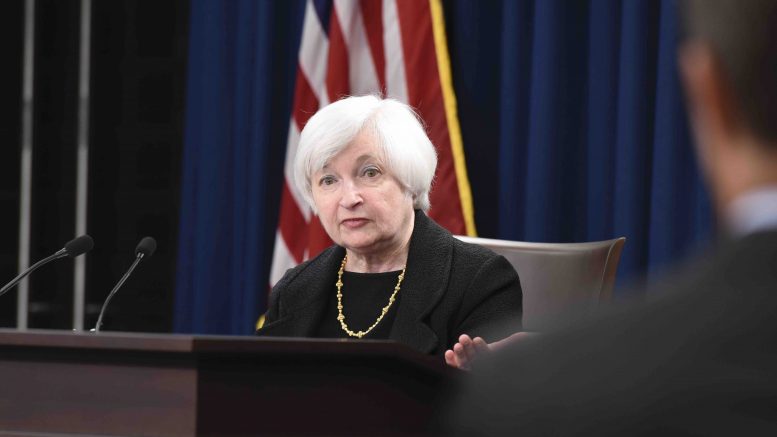Earlier this week U.S. President-elect Joseph R. Biden Jr. named his first round of cabinet nominations, choosing Janet Yellen as his Treasury secretary. If confirmed, Yellen will be the first woman to head the treasury department in its 231-year history.
Yellen is well qualified for the job with roughly thirty years of policy making under her belt. She was chairwoman of the U.S. Federal Reserve from 2014 to 2018, and the first woman to hold that position. Prior to that, she served as Fed vice-chairwoman (2010-2014); was president of the Federal Reserve Bank of San Francisco (2004-2010), and headed the White House Council of Economic Advisers during the Clinton administration (1997-1999). She also served as a Fed governor (1994-1997).
The labour economist has a doctorate in economics from Yale University and an undergraduate degree in economics from Brown University. (She is married to George Akerlof, who received the Nobel Prize in economics in 2001.)
Henry M. Paulson Jr., a former Treasury secretary under President George W. Bush, praised Biden’s choice, and was quoted in The New York Times as saying that Yellen “will have a tough job ahead of her, but she has the experience, talent, credibility and relationships with members of Congress on both sides of the aisle to make a real difference.”
Yellen will have an enormous challenge reconstructing the U.S. economy during a pandemic that has yet to be brought under control and has left millions unemployed. She has already signalled her support for more fiscal stimulus measures and deficit-financed government spending. In an interview in September with The Wall Street Journal, Yellen made her views clear: “’This is not a good time to have fiscal policy switch from being accommodative to creating a drag,’” she said. “’That’s what happened [last decade], and it retarded the recovery.’”
Her biggest concerns, if confirmed, will be spending and debt (the federal budget deficit hit US$3.1 trillion in the year ended Sept. 30). “The question for Ms. Yellen is how far to push U.S. borrowing,” a reporter at The Wall Street Journal reported on Nov. 24. “As Treasury secretary one of her main jobs would be to raise the money that funds the government. That comes mainly through changes in tax policy or increased borrowing.”
If the past is any guide, she also believes in holding interest rates down to support economic growth and employment. When she served as Fed vice-chairwoman under then Fed chairman Ben Bernanke, the central bank kept short-term interest rates near zero, and as Fed chairwoman, Yellen kept rates near zero until late in 2015, before raising them gradually.
Traditionally she has also supported greater financial regulation and bank supervision, and is a believer in carbon taxes to fight climate change.
Among her other challenges will be Washington’s relationship with Beijing. In a trip to Hong Kong in January, she acknowledged that the U.S. has “very difficult issues that lie ahead” with China.
During the election campaign, Biden called Chinese President Xi Jinping a “thug” and in an essay he wrote for the March/April issue of Foreign Affairs, described China as “a special challenge.”
“I have spent many hours with its leaders, and I understand what we are up against,” he penned. (In fact, The Wall Street Journal reports that Biden has spent more time with Xi “than any other foreign official” including “25 hours of private meals” and “24,000 miles of travel together.”)
“China is playing the long game by extending its global reach, promoting its own political model, and investing in the technologies of the future,” Biden wrote. “The United States does need to get tough with China. If China has its way, it will keep robbing the United States and American companies of their technology and intellectual property. It will also keep using subsidies to give its state-owned enterprises an unfair advantage—and a leg-up on dominating the technologies and industries of the future.”
Biden outlined in his essay the need to compete in the strategic race for global economic and technological leadership – given China’s rise and growing might as the world’s second-largest economy.
“To win the competition for the future against China or anyone else, the United States must sharpen its innovative edge and unite the economic might of democracies around the world to counter abusive economic practices and reduce inequality,” he wrote. “There is no reason we should be falling behind China or anyone else when it comes to clean energy, quantum computing, artificial intelligence, 5G, high-speed rail, or the race to end cancer as we know it.”
For its part, China waited several days before congratulating Biden on his victory, even after years of toxic confrontations over tariffs and technology under President Donald Trump, suggesting Beijing doesn’t believe Biden will be much easier to deal with than his predecessor.
Despite Biden’s tough words on China, expectations that tensions will continue, and uncertainty whether the incoming president will roll back some of Trump’s China tariffs, many are still hopeful that the tone of the relationship will improve and become less erratic as the U.S. president-elect seeks to cooperate with Beijing on issues about which the two countries can find common ground – such as global warming, public health, and the dangers of nuclear proliferation in countries like North Korea and Iran. If nothing else, a more measured approach by Biden will go a long way in stabilizing the relationship and making it more coherent.
For now, however, Biden’s immediate priority will be bringing the pandemic under control and, with colleagues like Yellen at his side, help rebuild the country’s damaged economy.


Be the first to comment on "Biden, Yellen and Sino-American relations"